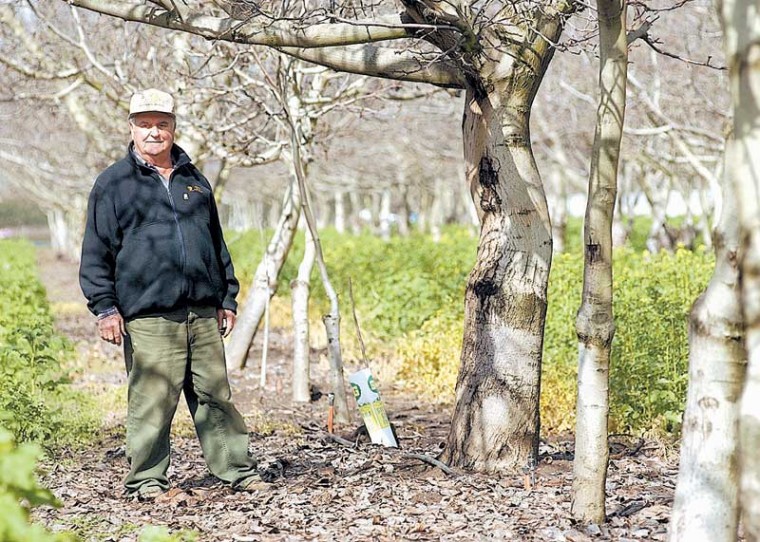
Hollister
– Al Bonturi is one of San Benito County’s agricultural
pioneers.
Hollister – Al Bonturi is one of San Benito County’s agricultural pioneers.
More than half a century ago, the 81-year-old walnut grower brought the first Mexican laborers to San Benito to harvest crops. More recently he has been experimenting with newly developed walnut varieties. And he doesn’t plan to stop anytime soon.
On Tuesday, Bonturi and Bill Coates, a farm adviser with the University of California Cooperative Extension, drove to Davis to pick up 10 experimental varieties of English walnut top stock from the university.
Bonturi will graft the experimental stock onto existing rootstock in his 50-acre walnut orchard. He and university researchers will then watch to see if it is able to fend off deadly blackline disease, which Coates said is the biggest threat to local walnut trees.
“I feel these are going to be the salvation of the walnut industry in the county,” Bonturi said, “because blackline is wiping us out.”
The walnut crop in San Benito generates $2 million annually, according to the San Benito County agricultural commissioner’s office.
San Benito County is the first county in the state to test the varieties that Coates and Bonturi picked up on Tuesday. Bonturi began using the university’s varieties, developed through conventional breeding techniques, five years ago, Coates said.
“Al Bonturi has been an excellent cooperator for our office,” Coates said.
Both Coates and fellow San Benito walnut grower Paul Hain recognize what Bonturi has done for the heath of local walnut trees. As a member of the Federal Walnut Marketing Board for 20 years, Bonturi has also done much to advance the promotion of walnuts both statewide and internationally, Hain said.
Bonturi’s agricultural journey began 67 years ago when his father died, leaving him in charge of his family’s orchards at the age of 14.
“I happened to be the oldest boy and I had to take over,” Bonturi said. “Luckily my father had taught me all the operations.”
When Bonturi took the helm in 1939, the family farm grew apricots, table grapes, prunes and walnuts. Gradually, the family phased out grapes and prunes, focusing on the more economically viable apricot and walnut trees.
In 1950, the San Benito County Farm Labor Association flew Bonturi, who speaks Spanish, to Hermosillo, Mexico, to recruit men through the Bracero program. The Bracero program was initiated in 1942 to bring Mexican farm workers to the United States because of a labor shortage during World War II.
Bonturi was to find tall men who could pick pears and apricots, he said.
“I went down there, I was young, I hadn’t seen that kind of poverty and I felt bad for them,” Bonturi said.
Bonturi hand-picked more than 600 men under the grandstands of a bullfighting stadium, he said. The men were taken to the U.S.-Mexico border, where the labor association put them on 10 buses bound for the labor camp on Southside Road.
Juventino Ortiz got his start as a Bracero picking apricots for Bonturi and eventually became manager of the labor camp.
Ortiz remembers Bonturi’s kindness when he began working for him in 1945.
“His father had just died,” Ortiz said. “And he took charge of the orchard like a man.”
But apricots, like grapes and prunes, eventually faded from Bonturi’s orchards because of labor costs, he said.
“The ‘cots for me were labor intensive,” Bonturi said. “And I found that walnuts were going to be mechanized, so I switched over.”
Labor was Bonturi’s biggest cost when he began farming 67 years ago. Through the years, Bonturi has seen his labor costs drop with changes in farming technology.
And now, after moving from contour watering to micro sprinklers, water has become his farm’s biggest expense, Bonturi said.
He has also seen Hollister go from a population of 5,000 to just less than 40,000.
“You’re getting more homes now than orchards,” Bonturi said. “But I guess that goes with the times.”
But certain aspects of Bonturi’s life never changed.
He still uses a metal probe to evaluate the moisture of soil samples instead of electronic probes, he said.
He still works in his shed, making many of his own tools for orchard work.
He still lives on the property where he was born, will celebrate his 57th wedding anniversary with his wife Corinne in May and doesn’t plan to stop working any time soon.
“Here we are, 2007, and things are still going,” Bonturi said. “Changes are being made but luckily we haven’t lost too many things.
Michael Van Cassell covers public safety for the Free Lance. He can be reached at 831-637-5566 ext. 335 or mv*********@***********ws.com.








